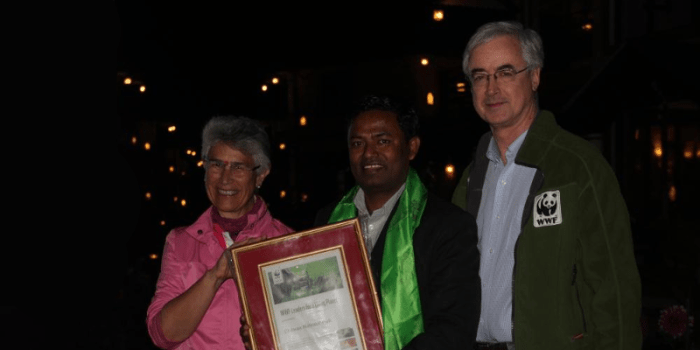WWF scandal (part 10): BuzzFeed News investigation reveals WWF’s secret war

A year long investigation in six countries by BuzzFeed News finds that the World Wide Fund for Nature funds eco-guards who have tortured and killed people. Buzzfeed News’ report, written by Tom Warren and Katie J.M. Baker, is available here.
The report is based on “more than 100 interviews and thousands of pages of documents, including confidential memos, internal budgets, and emails discussing weapons purchases”.
Warren and Baker write that,
In national parks across Asia and Africa, the beloved nonprofit with the cuddly panda logo funds, equips, and works directly with paramilitary forces that have been accused of beating, torturing, sexually assaulting, and murdering scores of people.
They report that:
Villagers have been whipped with belts, attacked with machetes, beaten unconscious with bamboo sticks, sexually assaulted, shot, and murdered by WWF-supported anti-poaching units, according to reports and documents obtained by BuzzFeed News.
The charity’s field staff in Asia and Africa have organised anti-poaching missions with notoriously vicious shock troops, and signed off on a proposal to kill trespassers penned by a park director who presided over the killings of dozens of people.
WWF has provided paramilitary forces with salaries, training, and supplies — including knives, night vision binoculars, riot gear, and batons — and funded raids on villages. In one African country, it embroiled itself in a botched arms deal to buy assault rifles from a brutal army that has paraded the streets with the severed heads of alleged “criminals.”
The charity has operated like a global spymaster, organizing, financing, and running dangerous and secretive networks of informants motivated by “fear” and “revenge,” including within indigenous communities, to provide park officials with intelligence — all while publicly denying working with informants.
A death in Nepal
The report starts with the tragic story of Shikharam Chaudhary who was locked up by rangers at the Chitwan National Park in June 2006, suspected of rhino poaching.
When his wife Hira brought him some food, he was in too much pain to swallow. He told her the rangers were torturing him. “They beat him mercilessly and put saltwater in his nose and mouth,” Hira later told police.
A week later, rangers dropped Shikharam at a local hospital in Bharatpur. He was unconscious. Two days later, he was dead.
The autopsy showed seven broken ribs and bruises all over his body. Seven eyewitnesses confirmed that he was beaten nonstop. Three park officials were arrested and charged with murder.
In March 2007, the Nepalese government dropped the case against the park officials. WWF declared this a victory.
Anil Manandhar, Country Representative of WWF Nepal, said in a statement that,
“WWF welcomes the government’s decision. I have every confidence that this move will renew the motivation of park staff and other conservationists to save Nepal’s rhinos and root out illegal wildlife trade. WWF will always be there to support this endeavor in any way we can.”
And WWF Nepal continued to work with the rangers, and fund the park, as if nothing had happened. Ritesh Basnet, one of the rangers who was charged with Shikharam’s murder, was subsequently hired to work for WWF Nepal.
WWF Living Planet award for a waterboarder
Another of the rangers, Kamal Jung Kunwar, later became chief warden of the Chitwan National Park. In 2014, he received a WWF “Leaders for a Living Planet” award from then-WWF president Yolanda Kakabadse and then–director general Jim Leape:
By this time, Kamal Jung Kunwar had published his memoir, “Four Years for the Rhino”. The book describes waterboarding as one of his favourite interrogation techniques. The book has since been made into a film.
Warren and Baker write that,
Kunwar freely admitted that the forces he oversaw as coordinator of the park’s anti-poaching operation unit regularly beat suspects. He wrote about giving a suspect a “hard slap,” buying packets of chilli powder for sprinkling into suspects’ eyes, and watching as a fellow ranger punched a boy in the nose until it “started bleeding profusely.” In another, he described a Tibetan boy who refused to speak during interrogation until soldiers poured water into his nose and eyes — the same waterboarding technique Shikharam had described to his wife.
“This was how I learned to pour water into the nose while interrogating,” Kunwar wrote. “To tell the truth, after that we used this method many times in Chitwan. This method was useful in obtaining information.”
Another WWF cover-up?
WWF has launched an “independent review” led by human rights specialists into the BuzzFeed News report. In a statement to BuzzFeed News, WWF writes that, “many of BuzzFeed’s assertions do not match our understanding of events”. WWF declined to answer BuzzFeed News’ detailed questions.
As Survival International points out, “WWF has consistently failed to tackle the problem, and has refused to suspend its funding or properly investigate the huge number of victims’ complaints.”
In a statement, Survival International’s Director Stephen Corry said:
“This is the scandal that WWF has been covering up for decades. Its supporters’ money is spent on funding violent and abusive ecoguards who assault, torture and even kill tribal people with impunity.
“Will WWF continue with ‘business as normal’ after these truly shocking revelations, or will it, finally, actually address the problem? Its name and logo are for many tribal people synonymous with violence, persecution and fear. WWF has hidden this from its supporters for years, but the truth is now out.”





